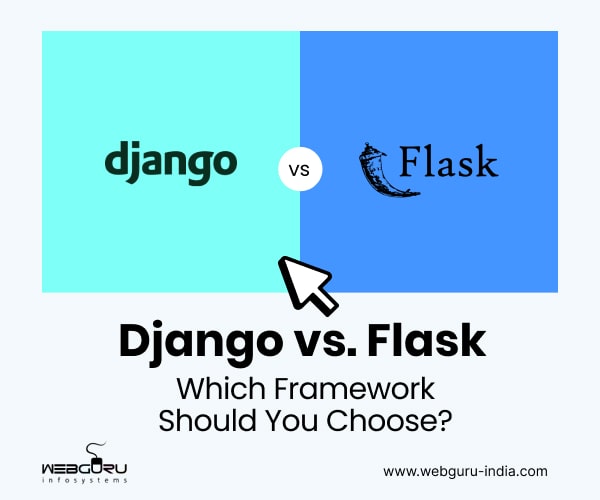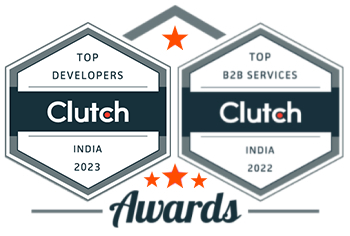Home Blog Web Application Development Django vs. Flask- Your Ultimate Guide to Choosing the Most Suitable Framework
Django vs. Flask- Your Ultimate Guide to Choosing the Most Suitable Framework
- 31 Jul / 2024
- 2,133 views
- 8 Min Read

If you are aspiring to create a web application that is as innovative, and user-friendly as Netflix or Spotify then it is crucial to acquire the right knowledge to make informed decisions. Choosing between the Django and Flask frameworks can be daunting, and will depend on several key factors. We have gathered all the relevant information in this blog and compared the two frameworks to help you make the best decision. Go ahead, give this blog a read, and achieve your dreams!
Among the several programming languages available, Python has made a huge mark as one of the most versatile high-level programming languages. Top web application development companies prefer it for its comprehensive standard library and extensive ecosystem. In fact, the demand for Python will remain high as businesses strive to improve their online presence and user experience in the upcoming years. So, if you have chosen it, then you can relate to what has been mentioned here. Now coming to frameworks- Django and Flask, two of the most used by web application developers have separate community acceptance, and differ in terms of performance, and use cases. Choosing between the two can be a daunting task, and needs proper understanding. In this blog, we have scrutinised both frameworks closely to help you understand what would be the best pick for you.
Comparing Django and Flask: Which Framework Fits Your Project?
What Is Django?
Django is a free and open-source framework that was first released in the year 2005. It was the brainchild of Adrian Holovaty and Simon Willison, the programmers of “Lawrence World Sports,” a British Magazine to be precise. It is an advanced Python framework that includes configurations for full-stack development, including table settings, request and troubleshooting handling, cookies, form validation, unit tests, and template layouts. These configurations enable developers to create dynamic web applications.
It follows a MVT aka Model-View Template architectural pattern that enables the developers to execute both regular and complicated tasks seamlessly. The best part is tasks like creating applications with demanding performance requirements and websites powered by databases can be accomplished with minimum interference of the protocols management, and systems.
It is no surprise that Django supports popular companies such as Quora, Instagram, Discovery Channel, Spotify, Mozilla, National Geographic, and more!
What Is Flask?
Flask was developed by Armin Ronacher and the interesting part is that while developing a solution, combining Werkzeug, a server framework and Jinja 2, a template library, Flask was developed accidentally. It is a micro-framework, which is not dependent on external libraries for implementing its functionalities.
For website development, this framework is equipped with various technologies, tools and libraries. For open authentication, file uploading, object-relational mapping, and other uses, Flask provides extensions such as form validation.
This framework is also used by many famous companies namely Netflix, Samsung, Reddit, Lyft, Zillow and more.
Features of Django
A multitude of outstanding features offered by the Django framework make it ideal for companies employing developers for timely project delivery.
High Security
The approach of Django when it comes to security is highly praiseworthy. It helps the users fight off malicious threats such as SQL injection, cross-site scripting or XSS, cross-site request forgery or CSRF, clickjacking and more.
Vulnerabilities that the backend developer might have forgotten to fix while building a web application are automatically patched by Django. Additionally, Django’s active user authentication feature allows you to manage user accounts and passwords securely.
Accommodating to Heavy-Load Project
Django is fast to adapt to heavy traffic such as complicated social networks and also content management systems.
Working with database systems like MongoDB and Redis can make it challenging to optimise loading times and performance; however, Django can handle all of the data quickly, which reduces loading time. No matter how intricate the coding is, Django further ensures error-free outcomes.
Follows a Don’t Repeat Yourself Philosophy
When you build a web app, there is much repetition. Generally, it has been observed that business logic and HTML templates are used repetitively. This kind of redundancy can lead to logical mistakes and issues in maintenance.
Django’s Don’t Repeat Yourself aka, DRY principle makes sure the information is not duplicated. The logic that backs up a group of data should be separate and dependable. Hence, you can concentrate on crafting new code while utilising previous codes again. That helps to speed up web application development.
SEO-Friendly
In addition to making site mapping easier, Django can create dynamic URLs and links based on specific keywords. You can raise your website’s search engine rankings by doing this.
Supports Several Packages
Django has many packages to help you build a complete application. It provides kits for almost everything, so it discourages you from depending on third-party sources.
For example, one may utilise APIs constructed using the Django REST framework or create cross-origin requests with the assistance of package Django CORS Headers. The application’s troubleshooting can be done by incorporating the Django Debug Toolbar and adding social and local authentication is possible through the usage of Django Allauth.
Features of Flask
A framework’s features frequently showcase the apps that it supports the most effectively. Many cutting-edge features are available in Flask for creating and refining web applications. Here are a few noteworthy Flask features that you should know about.
Unified Testing System
The integrated unit testing system of Flask promotes robust development and speeds up debugging.
Lightweight
Flask can develop without being reliant on third-party libraries therefore it is lightweight. The framework is Python-based, however, smaller in scope and devoid of any specific instrument.
It also lacks a database layer or built-in mechanisms for form validation, relying on extensions instead.
Supports Third-Party Extension
Flask facilitates the incorporation of third-party augmentations, enhancing the capabilities of your application. To supplement Flask’s functionalities, one may choose among various extensions; notably Flask SQLAlchemy for database utilisation and WTForms for convenient handling of web forms. Flask’s extensions encompass security-oriented ones as well, providing robustness to areas where Flask may lack.
Compatible With WSGI
Framework Flask is based on Werkzeug, which is a WSGI or Web Server Gateway Interface utility library. This makes the applications developed by Flask compatible with web services that are compliant with WSGI.
Although there are numerous WSGI web servers available, reliable servers like Nginx or Apache are required in a production setting. Fortunately, the WSGI functionality of Flask can be supported by configuring those widely used servers.
Advantages, and Drawbacks of Django
Django comes with several advantages and some disadvantages. You know, nothing that is interesting can be completely one-sided.
Advantages
• Full-stack framework
• Batteries-included concept
• Highly scalable
• Comprehensive documentation
• SEO-friendly
• Cross-platform compatibility
• Rapid development and fast processing
• High-level of security
• Excellent CDN management
Drawbacks
• Lack of conventions
• Limited components and design options
• Hard to master and has a steep learning curve
• Doesn’t allow for the simultaneous handling of multiple requests
Pros and Cons of Using Flask
Even though Flask has a plethora of functionality and is recognized for its user-friendly nature, there are some drawbacks that need to be mentioned. The advantages and disadvantages of using Flask are laid out here;
Advantages
• Accommodative for smaller projects
• Flexible with complete control access
• Scalable
• Adjustable to new tech
• Integrating into databases is easy
• Quick and easy-to-build prototypes
• Extensible
• Small codebase with easy functions
• Simplified URL routing using Werkzueg
• Enables architecture and library experimentation
Drawbacks
• Does not support multi-page apps
• Not equipped with the admin site
• Lacks of security features
• Maintenance is difficult
• No relational mapping without object additions
Comparing Django and Flask
Learning Curve
Django: Because of its “batteries-included” ideology, Django has a more challenging learning path. Programmers must study the many integrated traits and rules.
Flask: Flask’s simplicity and basic structure are helpful for those who are starting to learn. You can begin with simple elements and increase the complexity as required.
Development Speed
Django: Django, with its wide range of features, is very effective for quick development. The built-in admin interface, ORM and authentication system make it possible to create complex applications in a short time.
Flask: Flask can give you more power and options to control everything, but setting up and organising the needed parts might take longer time, mainly for bigger projects.
Flexibility and Customization
Django: Django’s rules and ready-made elements might limit certain projects. It is good for applications that match closely with what Django provides.
Flask: Flask’s simplicity gives more flexibility, letting developers pick the finest tools and libraries for their particular requirements.
Performance and Scalability
Django: Django has great scalability and performs well even with a high amount of load. Some built-in features, like the ORM, are designed for good performance but they might introduce some extra overhead.
Flask: Flask’s lightweight character implies it can be quicker for less complex applications or micro services. But, the ability to scale is determined by how effectively the application is planned and executed.
Community and Ecosystem
Django: Because it has a big community and many reusable apps and libraries, Django developers can find plenty of resources and support.
Flask: Flask also possesses a robust community, yet its ecosystem is less extensive when compared to Django’s. However, it’s growing rapidly, and many popular libraries are compatible with Flask.
Choosing the Right Framework
When deciding between Django and Flask, consider the following factors:
Project Requirements
Complexity: When applications are complex and need many features pre-built as well as fast development, often Django is preferred. It comes with everything needed for development which saves time.
Simplicity: Flask’s minimalist style makes it perfect for simpler applications, micro-services, or projects that need a lot of customization.
Developer Experience
Beginner-Friendly: For the simplicity and learning ease of Flask, it can be a better way to begin.
Seasoned Developers: People who have experience in developing websites could find Django appealing because it has a wide range of features and can handle complicated projects right from the start without needing much setup.
Long-Term Considerations
Scalability: If you expect that your application will require considerable scaling up, then Django’s included elements and ability to scale could make it a good choice.
Flexibility: If you desire flexibility for adjusting and altering your application’s structure, Flask’s modular nature gives better command.
Company Needs
Also, the choice might be influenced by partnering with a company for web application development. A firm having skills in Django could assist you to utilise the complete power of it whereas those knowledgeable about Flask could make sure that your flexibility is utilised optimally.
Conclusion
The demand for web applications that offer seamless performance, and are innovative is huge. Hence, to grow a loyal base of customers, companies are choosing everything with great care to build their web applications. We understand that you are also seeking the best choice that will enable you to achieve your dream application. If you are stuck, or confused about whether to choose Django or Flask, the details in this blog hopefully have successfully cleared all your doubts, and provide you the needful knowledge to make an informed decision. If you require more information, then it would be best to gather data from a top web application development company.

Sayari Banerjee
Dedicated SEO content writer, having a penchant for knowledge, and an insatiable appetite for reading books.
1 comment
Leave a Reply

-
1000+
Happy
Clients -
25+
Countries
Served -
19+
Years of
Trust








Thank you for sharing your thoughts! I appreciate your insights. Looking forward to hearing more of your thoughts in future discussions!